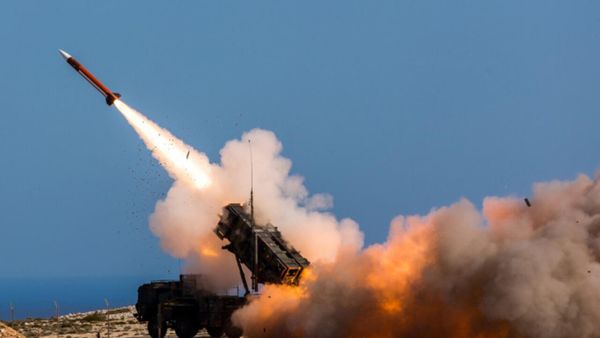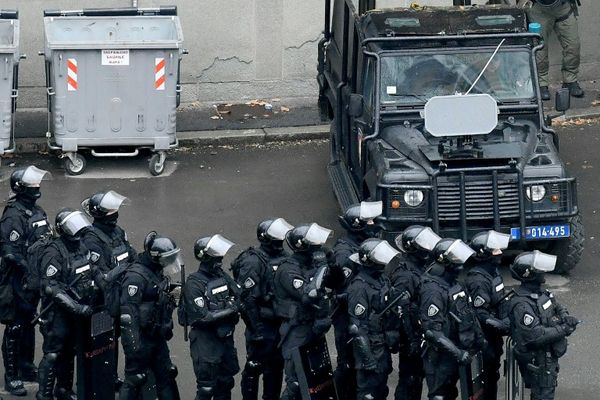
Eileen Gu and Zhu Yi, two Chinese naturalized athletes competing at the Beijing 2022 Olympic Winter Games, made their Winter Olympics debuts in the last two days, but were on the receiving end of two opposing extremes of public sentiment in China.
Skier Eileen Gu remained calm and confident at Big Air Shougang Olympic venue as the president of the International Olympic Committee (IOC) Thomas Bach watched the competition along with other spectators. After French world champion Tess Ledeux’s nearly perfect performance, the 18-year-old California-born Gu landed her first-ever leftside double cork 1620 which helped her claim the gold in women’s freeski big air.
One day earlier 19-year-old Zhu, also California-born, skated to the music “Sunset Boulevard” in the team competition free skate, but fell twice, bringing her total score to 91.41, and thus removing the Chinese team out of medal contention. She had also made many mistakes one day earlier in her short program, resulting in her finishing bottom in the women’s singles event. Upon concluding her performance, she broke down in tears in the Capital Indoor Stadium.
Her tears were not only because of her failed performance during her first Olympic experience but also due to the heated and unfriendly online debates surrounding her participation.
Compared with Gu who is seen as China’s golden girl, Zhu has been the target of immense cyber-aggression on social platforms. Some netizens have mocked Zhu by comparing her to the lackluster men’s national football team, likening her to “Chinese men’s football” of figure skating. Others say that Zhu never spoke Chinese during the competition and only accepted interviews with foreign media. Although these claims on her interviews were false, it has nonetheless caused damage to Zhu’s reputation.
There are also some Chinese netizens who have described China’s naturalization policy as something of a joke, as China has spent much tax money to naturalize athletes but, in the case of Zhu at least, she has dragged the team down instead of boosting them. Some people began to question the selection process of women’s singles of the Chinese figure skating team. They felt the process was not transparent, and there was even a rumor that Zhu received special care for participating in the Winter Olympics because of her father. Her father, Zhu Songchun, is a well-known computer scientist who has been awarded the Marr Prize three times, the highest international award in the field of computer vision. He is currently a professor at both Peking University and Tsinghua University. It is quite ridiculous and pathetic that some people transplant the idea of crony capitalism into sports.
In fact, it is a common shortcut for countries that do not have a strong tradition of ice and snow sports to boost morale through naturalization before big competitions.
Before the 2018 Pyeongchang Winter Olympics, South Korea naturalized 19 athletes, including 11 Canadian ice hockey players, as well as Russian, German and Canadian athletes for cross-country skiing, luge and biathlon events.
In comparison, the naturalization strategy of the Chinese delegation is mainly focused on overseas Chinese. In November 2018, in order to expand the selection range of athletes for the Beijing 2022 Olympic Winter Games, the General Administration of Sport of China stipulated that unregistered athletes, overseas Chinese and foreign athletes who meet the basic qualification requirements could sign up to compete for China. Before that, Gu had announced that she would become a Chinese citizen, and Zhu Yi joined the Chinese national figure skating team and the so-called “Morning Road” initiative led by the former world champion Chen Lu, which was aimed at recruiting figure skating talents from overseas. They were not alone. Out of the 23 members of the China Women’s Ice Hockey Team, 13 are naturalized athletes, while 15 of the 25 members of the Men’s National Team are naturalized.

Judging from the results, it is clear that China’s naturalization practice has worked miracles.
After her naturalization, Gu has harvested many gold medals for China. She has won several gold medals in the X Games, Youth Olympic Games, and FIS Freestyle Ski and Snowboarding World Championships. At the Beijing 2022 Olympic Winter Games, she won the gold in the women’s big air on Feb. 8, which is supposed to be her weakest event. After that, Gu put up outstanding performances in the women’s freeski halfpipe qualification and the women’s freeski slopestyle qualification. With these results, she has almost single-handedly brought change to China’s current lackluster competitiveness in snow events, while inspiring other fellow athletes: Snowboarder Su Yiming won silver in the men’s slopestyle after two nearly perfect runs, completely beyond expectation.
As China’s naturalization policy has mainly been focused on events with a wide audience and high marketization value, such as ice hockey and skiing, athletes’ outstanding performance will attract more and more Chinese people to these sports, which will greatly help their popularization after the Beijing Winter Olympics.
The case, however, might be a bit different when it comes to women’s single figure skating.
First of all, figure skating is an event that requires large, long-term investments. It requires a large pool of athletes to select from. The delivery of the choreography, the jumps, the skating and the artistic expression of the skaters also need systematic support. Behind the world’s figure skating powers — Russia, the U.S. and even South Korea and Japan — are undoubtedly large pools of skaters and strong commercial markets.
Second, when Chen Lu became the head of the national figure skating team, the “Morning Road” initiative was launched with a bang. Several high-profile athletes, Lin Shan, Zhu, Li Anqi and other skaters who had achieved good results in the U.S. Figure Skating Championships were naturalized, in the hope that they could contribute to the national team in the singles and team events in the Beijing Winter Olympics. However, due to the pandemic and other reasons that caused the plan to run aground, Zhu was stranded without systematic support, and although she seemed to rise fast several years ago, her development was soon impeded. In January 2018, when in her first year in high school, she won the women’s title in the novice division at the U.S. Figure Skating Championships, 35 points clear of second place, the only notable achievement in her career. At that time, some media speculated that she might be the new Michelle Kwan of American figure skating. But in the women’s singles at the 2018-19 Championships in December 2018, Zhu only finished fourth, and then 11th in the 2019 SHISEIDO Cup of China, 2019–20 ISU Grand Prix of Figure Skating. Her stumbles at the Beijing Winter Olympics were a continuation of that downward curve.

As a result of the shelving of the “Morning Road” initiative, Zhu was replaced by the unknown and inexperienced Chen Hongyi at the 2021 World Figure Skating Championships. Chen finished 21st, nearly missing out on qualifying for the Olympics. Under these circumstances, Zhu was naturally the best choice for the delegation aiming for a breakthrough, given also that she had also completed her naturalization. As for how she was selected, this is not the key issue as there were only a few candidates to pick from. Instead of investigating the selection process, it is better to look at the parties concerned and ask why they have not been able to do something practical and long-term to improve the development of single skating? Or, ask why people are flocking to pair skating, which is less competitive and where the improvements are more visible?
Most of the naturalized athletes of Chinese origin have a stronger sense of cultural belonging than the expensive foreign-based footballers and foreign athletes and coaches. For instance, Lin Yiqi, who helped the Chinese Women’s Ice Hockey team claim their first-ever victory, said that the enthusiasm at the scene made her feel proud, Gu is vigorously promoting the Chinese language in the Olympic Village, and Zhu is working hard on her Chinese language.

From a broader view, athletes of Chinese heritage are ambassadors of Chinese culture, with or without the citizenship. This includes the Chinese-American skater competing in the women’s single skating from the U.S. delegation adopting the Chinese orchestral work “The Butterfly Lovers Violin Concerto,” and the Chinese-Hungarian skaters Shaolin Sandor Liu and Shaoang Liu wearing racing suits with the Chinese and Hungarian flags embroidered on the chest in the men’s 1,000-meter short-track speed skating final, representing Hungary. Their performance and how they express themselves showcase the Chinese cultural identity, a certain inner strength, and the Olympic spirit.
This is what inspires us to look beyond a victory or defeat. It should also remove our narrow national outlook and make us think about the real connotation and significance of sports.
Yang Wang is a sports commentator.
Contact editor Bertrand Teo (bertrandteo@caixin.com)
Get our weekly free Must-Read newsletter.







